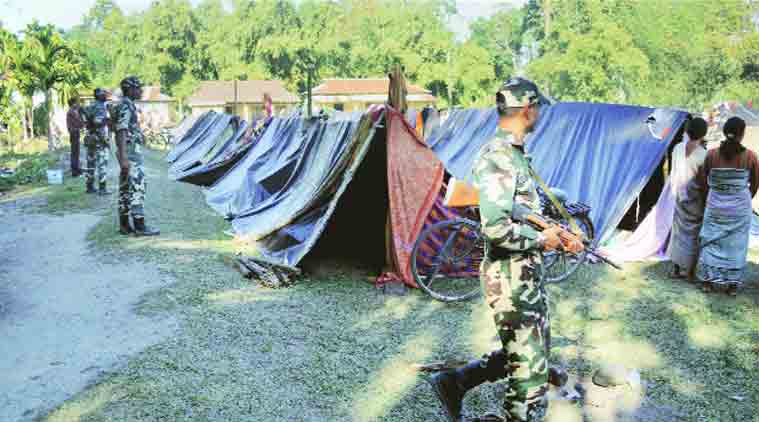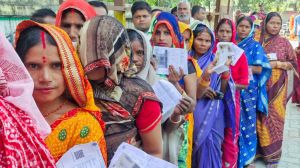Stay updated with the latest - Click here to follow us on Instagram
In Bengal, Bodo refugees ‘paying the price of crimes committed by our own’
Away from terror in Assam, adivasis, Bodos, share space in relief camps.
 At one of the camps at Balapara, in Alipurduar district of West Bengal. (Source: PTI)
At one of the camps at Balapara, in Alipurduar district of West Bengal. (Source: PTI)On December 24 at Dhanguri Tapu in Assam’s Kokrajhar district, members of the Bodo community, mostly Christians, were busy with the preparations for the Christmas celebrations at a local church when the news of violence in adjacent villages arrived at their doorstep. Father Deobar Nazhari, who was getting ready to preside over the Mass, soon ordered the people to leave everything behind and run for safety when it became clear that the mob was headed towards them.
Ten days later, these members, who have found shelter in a relief camp set up by the West Bengal government in Balapara on the banks of Kalapani, speak of “paying the price for the most heinous crimes committed by our own brothers”.
“I don’t want to mention any names but whoever has killed innocent children and women has done the most heinous crime. And we are paying the price because we had to face retribution from the communities who had suffered in the hands of some misguided elements from our own community. We are helpless,’’ Father Nazhari told The Indian Express.
Echoes Fenshri Basumatary, also a resident of Dhanguri Tapu in Assam: “We are paying the price for the misdeeds of some of our own people. Whatever you want, you should try to get it through talks. How can you kill children holding guns on their forehead?”
On the ill-fated evening of December 23, a group of 20 to 30 suspected National Democratic Front of Bodoland (Songbijit) militants targeted Adivasi communities (Santhals, Bheels and Mundas) in coordinated attacks at five different places in Assam’s two districts, killing, reportedly, over 70 people, most of them women and children. In retaliatory attacks, Adivasis reportedly hit back the nest day, killing five Bodo militants.
In the Balapara camp housing the Bodo settlers who had to flee after the protest attacks on December 24, a total of 458 refugees have found place alongside five Santhal (Adivasi) families.
“We have no enmity with them. They are our brothers,” Nirmal Nazhari, a resident of Sankoch Tapu in Assam, said.
Staying at Balapara not only gives the settlers a sense of security (the area is largely inhabited by members of the Bodo community), but also keeps them close to their native villages which is only 3-4 kms away. “From time to time, one or two members go back to check upon things that have been left behind such as the cattle, the orchards.”
But life away from home, in the midst of looming sense of danger that attacks may recur, the refugees from Assam (stationed in three other camps at Changmari, Madhya Haldibari and Purba Shalbari) do not know how long they will have to “run away from terror”.
“I had to leave behind everything. My books and copies. I have my schoolmates in other camps meant for Adivasis. All of us are running away from terror,” said Arzito Iswari, a student of class X at Kassiabari High School.
Nearly half-a-kilometer away from the camp, at Balapara forest beat office, are stationed 14 security personnel who are meant to safeguard the lives of these refugees in case of any attack.
“If there is any attack on the camp, everything will be over before the security people arrive. Even the SP had said they should sit at the camp. But they are not doing that,” Nirjaban Basumatary, a former member of Balapara panchayat, told The Indian Express.
Shiladitya Chakrabarty, BDO Kumargram, however said that adequate relief materials were being arranged. “We are regularly checking with our staff on the ground and if we find any requirement anywhere we will supply them,” Chakrabarty said.







